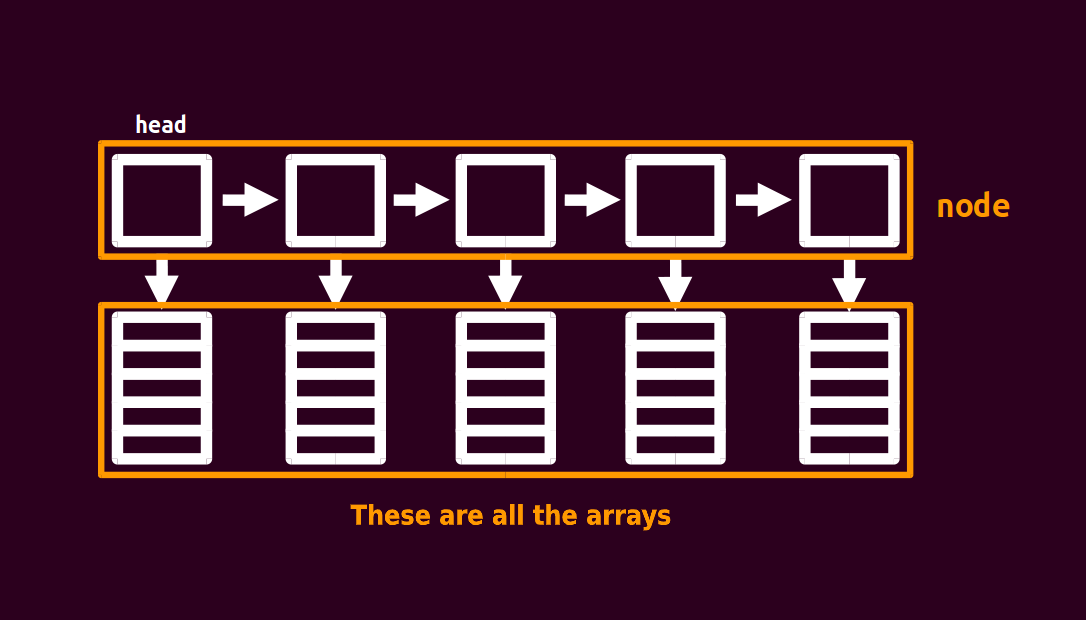Linked List
It is not hard to find that the block linked list is a linked list, and each node points to an array. We divide the original array of length n into sqn means sqrt(n) that is pb means push_back, that is, adding an element to this node.
struct node {
node* nxt;
int size;
char d[(sqn << 1) + 5];
node() { size = 0, nxt = NULL, memset(d, 0, sizeof(d)); }
void pb(char c) { d[size++] = c; }
};Block linked lists should at least support these operations: split, insert, and lookup. What is split? It is to split a node into two small nodes to ensure that the size of each node is close to node exceeds
How to do the split operation? First create a new node, and then copy the last size-- ), and finally insert the new node after the node being splited.
The time complexity of all operations of the block linked list is
There is one more thing worth mentioning here.
As elements are inserted (or deleted),
In fact, this is not the case. we could just set
list<vector<char> > orz_list;Sample problem¶
Solution: This is a very simple template problem. The code is shown below:
#include <cctype>
#include <cstdio>
#include <cstring>
using namespace std;
static const int sqn = 1e3;
struct node {
node* nxt;
int size;
char d[(sqn << 1) + 5];
node() { size = 0, nxt = NULL; }
void pb(char c) { d[size++] = c; }
}* head = NULL;
char inits[(int)1e6 + 5];
int llen, q;
void readch(char& ch) {
do
ch = getchar();
while (!isalpha(ch));
}
void check(node* p) {
if (p->size >= (sqn << 1)) {
node* q = new node;
for (int i = sqn; i < p->size; i++) q->pb(p->d[i]);
p->size = sqn, q->nxt = p->nxt, p->nxt = q;
}
}
void insert(char c, int pos) {
node* p = head;
int tot, cnt;
if (pos > llen++) {
while (p->nxt != NULL) p = p->nxt;
p->pb(c), check(p);
return;
}
for (tot = head->size; p != NULL && tot < pos; p = p->nxt, tot += p->size)
;
tot -= p->size, cnt = pos - tot - 1;
for (int i = p->size - 1; i >= cnt; i--) p->d[i + 1] = p->d[i];
p->d[cnt] = c, p->size++;
check(p);
}
char query(int pos) {
node* p;
int tot, cnt;
for (p = head, tot = head->size; p != NULL && tot < pos;
p = p->nxt, tot += p->size)
;
tot -= p->size;
return p->d[pos - tot - 1];
}
int main() {
scanf("%s %d", inits, &q), llen = strlen(inits);
node* p = new node;
head = p;
for (int i = 0; i < llen; i++) {
if (i % sqn == 0 && i) p->nxt = new node, p = p->nxt;
p->pb(inits[i]);
}
char a;
int k;
while (q--) {
readch(a);
if (a == 'Q')
scanf("%d", &k), printf("%c\n", query(k));
else
readch(a), scanf("%d", &k), insert(a, k);
}
return 0;
}buildLast update and/or translate time of this article2024/10/9 22:38:42,Check the history
editFound smelly bugs? Translation outdated? Wanna contribute with us? Edit this Page on Github
peopleContributor of this article Ir1d, ChungZH, HeRaNO, konnyakuxzy, Tiphereth-A, megakite, iamtwz, littlefrogfromthenorth, kenlig, Enter-tainer, Chrogeek
translateTranslator of this article Visit the original article!
copyrightThe article is available under CC BY-SA 4.0 & SATA ; additional terms may apply.
